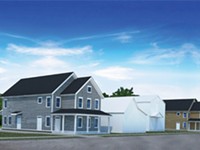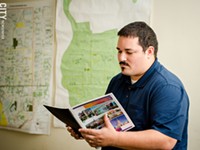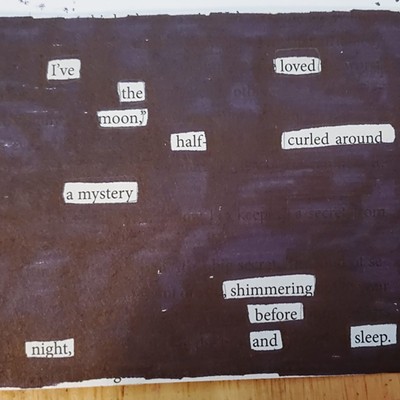[
{
"name": "500x250 Ad",
"insertPoint": "5",
"component": "15667920",
"parentWrapperClass": "",
"requiredCountToDisplay": "1"
}
]
Last in a series on Rochester neighborhoods and the fall city elections.
Sam Spoto has lived in the Maplewood neighborhood since the 1940's, and remains one of its most ardent cheerleaders.
"I remember when we had two movie theaters, grocery stores, lots of restaurants, and some major employers within walking distance," says Spoto, who heads the Maplewood Neighborhood Association. "Imagine being able to walk to everything today, including work. You could live here cheaply and raise a family; that's exactly what we did. It was great."
Spoto's pride for the Maplewood neighborhood isn't without merit. It's one of the city's oldest, with a history rich in industrial milestones and the scenic beauty of the Genesee River gorge and Lower Falls. The Maplewood Historic District boasts tree-lined streets and housing dating back to the mid-1800's. Maplewood Park and the street malls on Lakeview Park and Seneca Parkway were designed by Frederick Law Olmsted.
But even Spoto recognizes that Maplewood has had its ups and downs, and he's not terribly confident that the upcoming election will do much to change its prospects.
"The city hasn't been especially proactive in working with us," Spoto says. "We have a real jewel here," he says, but the city is investing in downtown and in other neighborhoods. "We have to fight for every nickel," he says. "It's not right."
In some ways, Maplewood is a microcosm of the larger changes around it, changes that the city has undergone during the last 30 years. Kodak, the onetime industrial giant at its northern border, employed tens of thousands of people and afforded many of its workers the ability to live in the middle-class neighborhoods along Dewey Avenue.
"Kodak always took an interest in this area, but when they started falling on hard times they just couldn't do as much," Spoto says.
One long-time resident who asked not to be named offered a much starker view of the state of Maplewood. "It's still a middle-class neighborhood," he says, but it is much different from the neighborhood he moved to in 1986. There are many more tenants, more vacant homes, and fewer retail anchors on the main streets, he says. Concerns about city schools haven't helped, either.
"It's really, really hard to get middle class-families to move in because of the schools," he says.
Maplewood is in transition, says Molly Clifford, City Councilmember for the northwest section of the city. The older homes are attractive, but they're not for everyone, she says.
"There are some great old homes, but not everyone can afford them, their renovations, and their upkeep," Clifford says. Though some people have been critical of past city administrations for permitting so many properties to become rentals, Clifford says many would be sitting vacant if, for instance, they weren't allowed to be duplexes.
Spoto says the city is making one major investment in the area: a significant upgrade of Dewey Avenue, what many people view as Maplewood's main street rather than Lake Avenue. And he says he's grateful to Mayor Warren for keeping the project moving forward.
"After 80 years, they're going to take the zig-zag out of it and make it a smoother, straighter avenue that's more walkable," Spoto says. He's also optimistic that photonics will help to improve the area around Kodak.
"I tell everybody: when I die, I'm not leaving the neighborhood," Spoto says. "I'm just going up the street to the cemetery."
While Maplewood is facing its share of challenges, they're not nearly as daunting as those in some neighborhoods. Just off North Clinton Avenue and Clifford Avenue is a stretch of side streets where the lots on all corners are little more than patchwork quilts of grass. In the area often referred to as the El Camino neighborhood, so many homes and buildings have been demolished that vacant lots are ubiquitous. Some streets have the sketchy look of a mouth with missing teeth.
The North Clinton corridor is a diverse community, but its large Latino population is what distinguishes it from other areas of the city.
"North Clinton is still seen as the cultural center, where the Latino flavor is the strongest," says Miguel Melendez, special projects director with Ibero-American Development Corporation.
It's also one of the city's poorest neighborhoods, with a long history of open-air drug trade. It's not unusual to drive down a North Clinton or Conkey Avenue side street and be approached by dealers assuming you're swinging through the area to buy. Eugenio Marlin, vice president of the Ibero-American Development Corporation, describes North Clinton as the region's brand name for illegal drugs, specifically heroin. The area's reputation is as much of an obstacle as the drug problem itself.
"It has become a convening area, because it's so accessible to 104," Marlin says. Users from all over the county come into the neighborhood to buy and use their drugs, leaving needles scattered across sidewalks and driveways, he says.
Melendez and Marlin say that the current administration has been working with residents to combat the problem.
"We're picking up fewer needles," says Melendez.
And Mayor Lovely Warren recently initiated a new program to combat opioid addiction involving the Rochester Police Department and Rochester Regional Health. Rather than making an arrest, officers have the option of offering drug offenders access to treatment.
Still, Marlin and Melendez are listening carefully to what all the candidates are proposing to eliminate North Clinton's drug problem, because it undermines all other efforts to improve the area, they say.
"It continues to victimize the neighborhood, whether intentional or not," Marlin says. "Parents, children, homeowners, business owners – we are all working harder and harder, but we continue to struggle with this, no matter how hard we work at it. We need political servants who are fully committed to improving the northeast. This has to end."
More police presence would help, says Ida Perez, a homeowner in the neighborhood. That would give residents more confidence to be active and less fearful of retaliation from dealers. The home she lives in belonged to her parents, and she says that contrary to what many people think, there are many long-time residents who don't rent. They're owners like her who refuse to leave, she says.
"Many people on my street are owners, but they just don't know what to do," says Perez. She tells them to call the police and be persistent.
There's another huge worry shared by some parents, she says.
"They fear that their kids will find out that selling is 'easy money,'" Perez says. "We have to get out of this fearful zone if things are going to get better."
The area's underlying problem with drugs has overshadowed its many positive aspects, Ibero's Marlin says. He points to Project HOPE, a collaborative program in the El Camino community designed to improve health and educational outcomes for families and children. New affordable housing in the form of 50 single-family, three- and four-bedroom units has been added to the neighborhood, Marlin says. And he's been urging the major employers near the area to help with job training and create employment opportunities.
There's an opportunity to capitalize on El Camino's unique Latino culture, Marlin says. Businesses can prosper on North Clinton, he says, citing El Pilon Criollo as an example of a restaurant that draws customers from all over the city.
"We have invested a lot of money in the area, about $20 million since 2000," he says. "We're working very hard and we're not going to stop."
Speaking of...
-

North Clinton block will get a redesign
Jul 3, 2019 -

New housing fuels hope and fears
Mar 6, 2019 -

A North Clinton cleanup focus: heroin sales
Jan 10, 2018 - More »
Latest in News
More by Tim Louis Macaluso
-

RCSD financial crisis builds
Sep 23, 2019 -

RCSD facing spending concerns
Sep 20, 2019 -

Education forum tomorrow night for downtown residents
Sep 17, 2019 - More »





